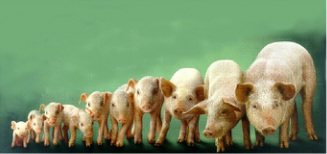There is an increasing gap between what is happening in research and the breeding practice.
The breeding sector is highly knowledge-intensive. It is important to find a good balance between knowledge sharing and the protection of newly developed knowledge and tools. There is an increasing gap between what is happening in research and the breeding practice. The exchange of knowledge and technologies need to increase in order to solve this problem. An opportunity for the EU is to decrease this gap between knowledge and further develop practical methods. This will lead to simplification of the use of reproductive techniques, and thus improvement of the competitive position of EU farmers and food producers. Skills and knowledge transfer of professionals working in the industry and
research need to keep developing through encouragement, training, public
funding support, life-long learning mechanisms, effective networks,
communication channels, partnering schemes, etc.
The increasing global market is a huge challenge. European breeders must compete directly with breeders outside the EU, especially the USA. Cooperation, transparency and communication are keywords for the future of the farm animal breeding industry.
It is important in animal breeding and reproduction research to connect a wide range of disciplines; biology, genetics, chemistry, statistics, computing sciences, economics, ecology, geography, ethics, sociology, farm management and the interactions of these disciplines.
Development of technologies should be done in a transparent way and in a constant discussion with society. The growing interest of consumers and breeders is a challenge for the whole agriculture sector. New technologies may improve one’s position in the global market; thus there is active competition for new technologies. These technologies may, directly or indirectly, affect the future of animal production. New technologies can increase in efficiency as long as there is no (negative) impact on animal health, animal welfare, or the environment. Development of new technologies can lead to new or increased expertise and development of the future, or to protect ourselves in the global trade market.
The increasing global market is a huge challenge. European breeders must compete directly with breeders outside the EU, especially the USA. Cooperation, transparency and communication are keywords for the future of the farm animal breeding industry.
It is important in animal breeding and reproduction research to connect a wide range of disciplines; biology, genetics, chemistry, statistics, computing sciences, economics, ecology, geography, ethics, sociology, farm management and the interactions of these disciplines.
Development of technologies should be done in a transparent way and in a constant discussion with society. The growing interest of consumers and breeders is a challenge for the whole agriculture sector. New technologies may improve one’s position in the global market; thus there is active competition for new technologies. These technologies may, directly or indirectly, affect the future of animal production. New technologies can increase in efficiency as long as there is no (negative) impact on animal health, animal welfare, or the environment. Development of new technologies can lead to new or increased expertise and development of the future, or to protect ourselves in the global trade market.
|
|
Opportunities for FABRE-TP:
There are several fundamental opportunities for FABRE-TP:
The development of genomic selection and the development and application of new techniques will be opportunities to fight or overcome issues as climate changes (e.g. reduce methane emissions from cattle and sheep). |
More cooperation in the sector between industry-industry or industry-research will improve the situation and bring new research opportunities.

